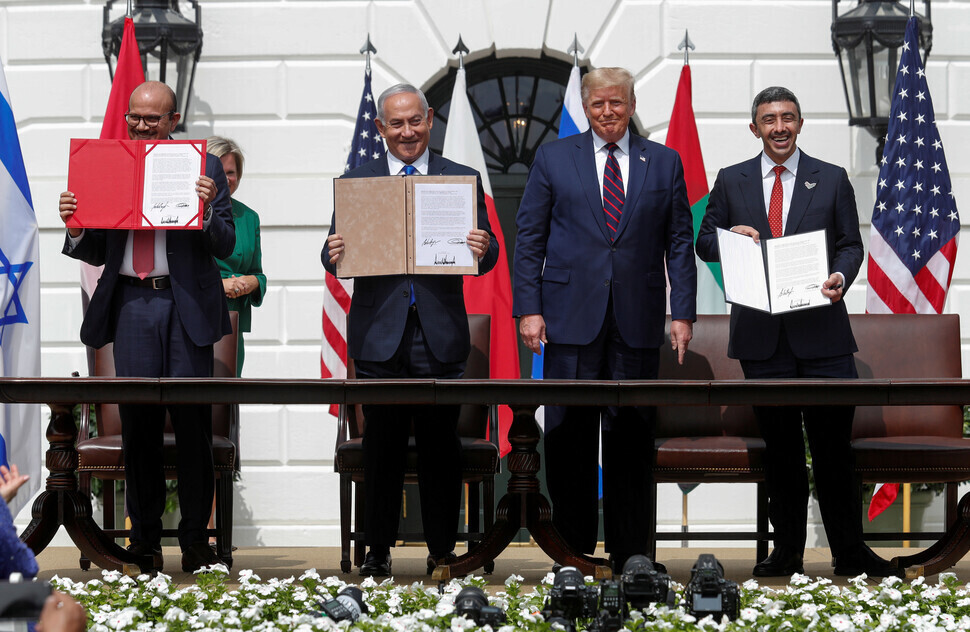hankyoreh
Links to other country sites 다른 나라 사이트 링크
How Washington’s plan for peace in the Middle East provided kindling for war

“I believe one of the reasons why Hamas struck when they did was they knew that I was working very close with the Saudis and others in the region to bring peace to the region by having recognition of Israel and Israel’s right to exist.”
The remarks made by US President Joe Biden on Nov. 24 encapsulate Washington’s understanding of why the two-month-long war between Israel and the Palestinian militant group Hamas erupted.
“I’ll remain engaged with leaders throughout the Middle East as we all work together to build a better future for the region,” Biden went on to say, adding that “Hamas unleashed this terrorist attack because they fear nothing more than Israelis and Palestinians living side by side in peace.”
Biden is claiming that Hamas launched the surprise attack on Oct. 7 that sent the world reeling in an attempt to upend the normalization of diplomatic ties between Israel and Saudi Arabia that the US had been pushing for.
As a result, Hamas took into its hands the lives of more than 16,000 Gazans and the devastating destruction of a city of 2.3 million people, and put the Israeli-Saudi normalization talks on hold. By doing so, the group has avoided a crisis of total isolation in which major Middle Eastern states, including Saudi Arabia, would no longer stand by its side.
In doing so, Hamas has made clear to the world once again the self-evident fact that there will be no peace in the region without resolving the Palestinian issue, the root of the Middle East’s problems.
The normalization of diplomatic relations between Israel and Saudi Arabia mentioned by Biden is an extension of the Abraham Accords, a major diplomatic achievement of his predecessor, President Donald Trump.
Trump signed the agreement on Sept. 15, 2020, at the White House with Israeli Prime Minister Benjamin Netanyahu and United Arab Emirates’ Foreign Minister Abdullah bin Zayed Al Nahyan, with all parties saying it heralded a “new dawn of peace.” Bahrain signed a similar accord with Israel the same day.
These agreements affirmed that Arab and Jewish people are descended from the same ancestor, Abraham, and pledged peaceful coexistence between the Arab states and Israel going forward.
After the UAE and Bahrain led the way on Sept. 15, Sudan followed on Oct. 23, as did Morocco on Dec. 10.

Promoted under the banner of the “Peace to Prosperity” initiative of the Trump administration, the Abraham Accords were promoted by the US with the strategic goal of uniting Israel and major Sunni states to keep Iran, the leading Shiite power, in check. This put Iran on edge, and caught Hamas off guard.
In December 2020, three months after the establishment of the Abraham Accords, Hamas’ leader, Ismail Haniyeh, launched an operation codenamed “Strong Pillar,” a military exercise that united Gaza’s various militant factions.
The Biden administration, which took office a month later, was determined to expand the Abraham Accords to counter China’s growing influence in the Middle East and repair relations with Saudi Arabia. A little over a year later, observations began to emerge over the summer of 2022 that the Saudis, under Biden’s dedicated mediation, had cleared the biggest hurdle on the path to normalizing relations with Israel.
On Sept. 19 of this year, the New York Times reported that the United States was discussing terms of a mutual defense treaty with Saudi Arabia, one similar to the pacts the US has with Japan and South Korea. The next day, Saudi Crown Prince Mohammed bin Salman appeared on Fox News, where he spoke about normalizing ties with Israel.
“Every day we get closer; it seems it’s for the first time real, serious,” the prince said, while projecting that a pact between the two would be “the biggest historical deal since the Cold War.”
In the midst of this rapidly changing landscape, Hamas staged a major surprise attack on Oct. 7, the Sabbath following the Jewish holiday of Yom Kippur and the day after the 50th anniversary of the start of the Yom Kippur War, which began with an Arab coalition raid on Israel in 1973.
On the day of the attack, Hamas spokesperson Osama Hamdan said it was a “message” to Arab countries that are considering normalizing relations with Israel. In effect, the Abraham Accords that promised peace had served as the spark that ignited a horrific war.
The attack succeeded in achieving Hamas’ strategic goal of staving off isolation, but whether it has brought the Middle East any closer to achieving peace remains to be seen.
The war has moved Israel and Palestine further away from the possibility of coexisting as two independent states. However, there is a consensus among the international community that the war in Gaza, which is causing massive civilian casualties, must stop.
As the Guardian put it on Nov. 26, as people die cruelly day by day, a “‘Sophie’s choice’ remains terrible. But it is still better than ‘ein breira’ – the lie that there is no choice.”
By Hong Seock-jae, staff reporter
Please direct questions or comments to [english@hani.co.kr]

Editorial・opinion
![[Editorial] Intensifying US-China rivalry means Seoul must address uncertainty with Beijing sooner than later [Editorial] Intensifying US-China rivalry means Seoul must address uncertainty with Beijing sooner than later](https://flexible.img.hani.co.kr/flexible/normal/500/300/imgdb/original/2024/0517/8117159322045222.jpg) [Editorial] Intensifying US-China rivalry means Seoul must address uncertainty with Beijing sooner than later
[Editorial] Intensifying US-China rivalry means Seoul must address uncertainty with Beijing sooner than later![[Column] When ‘fairness’ means hate and violence [Column] When ‘fairness’ means hate and violence](https://flexible.img.hani.co.kr/flexible/normal/500/300/imgdb/original/2024/0516/7417158465908824.jpg) [Column] When ‘fairness’ means hate and violence
[Column] When ‘fairness’ means hate and violence- [Editorial] Yoon must stop abusing authority to shield himself from investigation
- [Column] US troop withdrawal from Korea could be the Acheson Line all over
- [Column] How to win back readers who’ve turned to YouTube for news
- [Column] Welcome to the president’s pity party
- [Editorial] Korea must respond firmly to Japan’s attempt to usurp Line
- [Editorial] Transfers of prosecutors investigating Korea’s first lady send chilling message
- [Column] Will Seoul’s ties with Moscow really recover on their own?
- [Column] Samsung’s ‘lost decade’ and Lee Jae-yong’s mismatched chopsticks
Most viewed articles
- 1[Editorial] Transfers of prosecutors investigating Korea’s first lady send chilling message
- 2Xi, Putin ‘oppose acts of military intimidation’ against N. Korea by US in joint statement
- 3[Editorial] Intensifying US-China rivalry means Seoul must address uncertainty with Beijing sooner t
- 4[Exclusive] Unearthed memo suggests Gwangju Uprising missing may have been cremated
- 5‘Shot, stabbed, piled on a truck’: Mystery of missing dead at Gwangju Prison
- 6[Column] US troop withdrawal from Korea could be the Acheson Line all over
- 7China, Russia put foot down on US moves in Asia, ratchet up solidarity with N. Korea
- 8Putin’s trip to China comes amid 63% increase in bilateral trade under US-led sanctions
- 9[Column] When ‘fairness’ means hate and violence
- 10[Reporter’s notebook] What’s the secret behind BTS’ success?